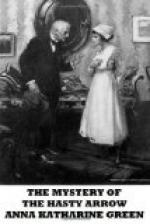“I see. And this man?”
“Was well within my view from the minute I entered the first arch. He seemed more bewildered than frightened till he had passed the communicating arch and nearly stumbled over the body of the girl shot down almost at his elbow.”
“And yourself?”
“I knew by his look that something dreadful had happened, and when I saw what it was, I didn’t think of anything better to do than to order the doors shut.”
“On your own initiative? Where was the Curator?”
“Not far, it seems. But he gets awfully absorbed in whatever he is doing, and there was no time to lose. Some one had shot that arrow, some one who might escape.”
Mr. Gryce never allowed himself—or very rarely—to look at anyone full and square in the face; yet he always seemed to form an instant opinion of whomever he talked with. Perhaps he had already gauged this man and not unfavorably, for he showed not the slightest distrust as he remarked quite frankly:
“You must have had some suspicion of foul play even then, to act in so expeditious a manner.”
“I don’t know what my suspicions were. I simply followed my first impulse. I don’t think it was a bad one. Do you, sir?”
“Far from it. But enough of that. Do you think”—here he drew Correy into the gallery out of earshot of the boy, who was watching them with all the curiosity of his fourteen years—“that this lad could have stolen from where we are standing now to the door where you first saw him, during the time you were making your rush up the stairs? Boys of his age are mighty quick, and——”
“I know it, sir; and I see what you mean. But even if he had been able to do this,—which I very much doubt,—no boy of his age could have strung that bow, or had he found it strung, have shot an arrow from it with force enough to kill. Only a hand accustomed to its use could handle a bow like that with any success.”
“You know the bow, then? Saw it nearer than you said—possibly handled it?”
“No, sir; but I know its kind and have handled many of them.”
“In this building?”
“Yes, sir, and in other museums where I have been. I have arranged and rearranged Indian exhibits for years.”
“Then you think that the bow we saw behind the tapestry is an Indian one?”
“Without question.”
The detective nodded and left him. One word with the boy, and he would feel free to go elsewhere.
It proved to be an amusing one. The boy, for all his enthusiasm as a scout, proved to be so hungry that he was actually doleful. More than that, he had a ticket for that afternoon’s ball game in his pocket and feared that he would not be let out in time to see it. He therefore was quick with his answers, which certainly were ingenuous enough. He had been looking at the model of a ship (which could be seen through an open door), when he heard




